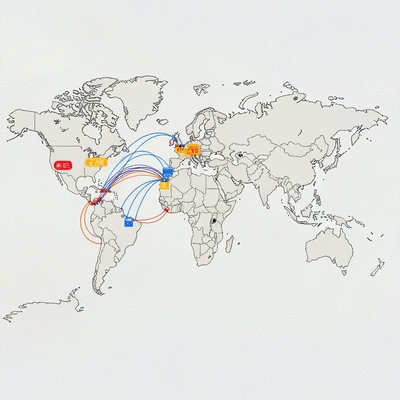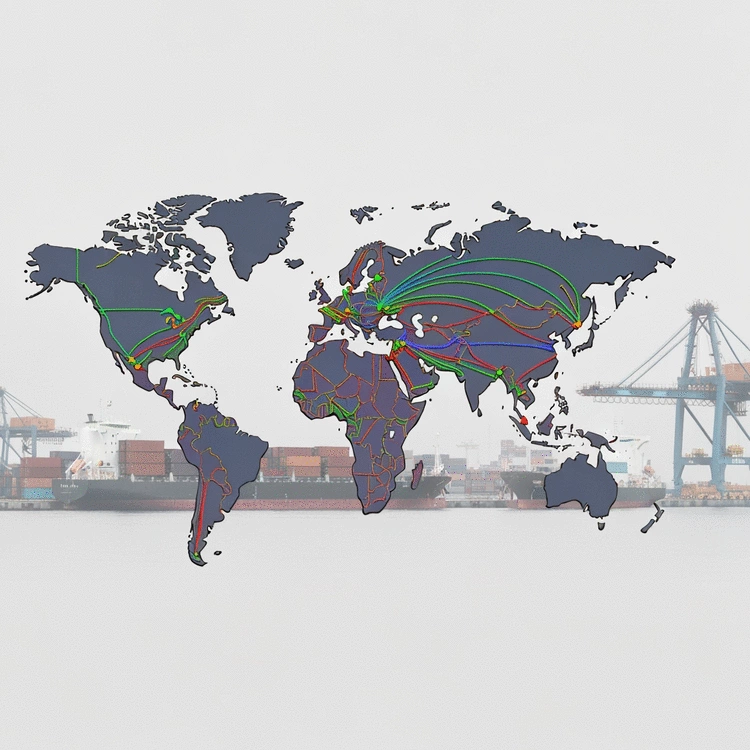In a world where supply chains are increasingly vulnerable to disruptions, understanding the core factors at play has never been more crucial. How do geopolitical tensions, climate change, and economic fluctuations intertwine to affect global trade? Let’s explore the essential insights that will empower both businesses and consumers to navigate these challenges effectively.
What You Will Learn
- Geopolitical tensions can lead to trade restrictions, impacting the flow of goods and increasing costs for consumers and businesses.
- Climate change poses significant risks to supply chain reliability, with extreme weather disrupting transportation and damaging infrastructure.
- Economic factors such as inflation and material shortages can delay production and raise costs, necessitating careful monitoring by businesses.
- Trade policy changes require businesses to stay informed and adaptable, as shifts can have immediate and significant effects on supply chains.
- Collaboration and innovation among stakeholders are vital for creating resilient supply chains that can withstand future disruptions.
- Consumer engagement enhances business strategies, fostering loyalty and improving agility in response to market challenges.
Key Factors & Policy Recommendations for a Resilient Supply Chain
Analyzing the causes of disruptions and strategic responses for businesses and governments. Understanding these elements not only helps us grasp the current market landscape but also prepares us for future challenges. For a deeper dive into global dynamics, consider exploring 2025's Key Geopolitical Risks for Investors.
Key Factors Contributing to Supply Chain Disruptions
- • Geopolitical Tensions: Trade restrictions, sanctions, political unrest.
- • Climate Change: Extreme weather, natural disasters, infrastructure damage.
- • Economic Factors: Inflation, material shortages, rising costs.
- • Trade Policy Changes: Regulatory shifts, tariffs, quotas.
Policy Recommendations for Stabilizing Global Supply Chains
- • Public-Private Partnerships: Foster innovation & responsiveness.
- • Support Local Production: Reduce dependency on distant suppliers.
- • Flexible Trade Policies: Adapt to changing global dynamics.
- • International Organizations: Facilitate fair trade & collaboration.
Actionable Steps for Businesses to Improve Resilience
- • Incorporate Sustainability: Renewable resources, waste reduction.
- • Regular Risk Assessments: Identify vulnerabilities proactively.
- • Leverage Technology: Inventory management, forecasting.
- • Data Analytics: Better demand forecasting, real-time tracking.
Engaging Stakeholders for Stronger Strategies
- • Consumer Feedback: Surveys, social media, forums.
- • Partner Collaboration: Joint problem-solving, sharing best practices.
- • Government Initiatives: Trade agreements, infrastructure investment.
- • Business Strategies: Consumer-focused, agile models, technology investment.
Understanding Global Supply Chain Disruptions and Their Causes
In today's interconnected world, global supply chain disruptions can significantly impact our daily lives and the economy. As a journalist passionate about technology and its implications, I've observed numerous instances where these disruptions have created a ripple effect across various sectors. Understanding the root causes of these issues is crucial for businesses and consumers alike.
From geopolitical tensions to climate change, several key factors contribute to the instability of supply chains worldwide. Let's delve deeper into these influences and their implications for global trade.
Key Factors Contributing to Supply Chain Disruptions
When analyzing the complexities of modern supply chains, we must consider several critical factors:
- Geopolitical tensions: Political conflicts can lead to trade restrictions and sanctions, disrupting the flow of goods.
- Climate change: Extreme weather events can damage infrastructure and create logistical challenges.
- Economic factors: Inflation and material shortages can increase costs and delay production.
- Trade policy changes: Shifts in regulations can impact how businesses source and distribute their products.
Let’s take a closer look at each factor that plays a role in supply chain disruptions.
Geopolitical Tensions and Their Impact on Trade
Recent years have highlighted how geopolitical tensions can create significant hurdles in international trade. Events such as trade wars, sanctions, and political unrest make it difficult for businesses to navigate their supply chains effectively. For instance, when a country imposes tariffs on imports from another nation, it can lead to increased expenses for consumers and businesses alike. For more insights on this, you might be interested in US-China Relations and Global Impact.
As we witness these tensions, it's essential for companies to remain adaptable and flexible in their operations. Being aware of global politics can empower businesses to strategize accordingly.

Climate Change: Consequences for Supply Chain Reliability
Climate change is no longer a distant issue; it directly affects supply chain reliability today. Natural disasters like hurricanes and wildfires can disrupt transportation routes and damage facilities. These events can lead to substantial delays and unexpected costs, making proactive planning essential.
Moreover, companies that embrace sustainable practices are not only contributing to a healthier planet but can also build more resilient supply chains. Sustainability should be at the forefront of our approach to future-proofing our operations.
Economic Factors: Inflation and Material Shortages
Current economic conditions greatly influence supply chain dynamics. Rising inflation puts pressure on production costs, while material shortages can halt manufacturing processes. Businesses must remain vigilant in monitoring these economic trends to make informed decisions.
By understanding the intricacies of inflation and its impact on pricing and availability, companies can better navigate the challenges that arise from fluctuating markets. This awareness helps in maintaining their competitive edge.
Trade Policy Changes and Their Effects on Global Supply Chains
Trade policies are constantly evolving, and changes can have immediate consequences for supply chains. Regulatory shifts can affect tariffs, import quotas, and general compliance requirements. Companies must stay informed about these changes to avoid disruptions.
Adapting to new trade policies can be daunting, but it also presents opportunities for businesses to innovate and refine their strategies. As a community, we must engage in conversations about these changes and share insights on best practices.
The Ripple Effect: How Disruptions Impact World Markets
Now that we’ve explored the causes of supply chain disruptions, it's essential to consider the broader implications. The impact of these issues reaches far beyond individual companies, affecting global markets, consumer prices, and overall economic stability.
In the next section, we'll discuss how these disruptions ripple through various sectors, influencing everything from freight costs to production schedules.
We Want to Hear From You!
How do you believe global supply chain disruptions will evolve in the coming years? Share your thoughts below:
Looking Ahead: Navigating Future Supply Chain Challenges
As we look to the future, navigating supply chain challenges requires a proactive approach. The complexities of the global market necessitate forward-thinking policies and innovative business strategies. My experiences at The Stone Builders Rejected have shown me that staying informed on these issues is crucial for businesses aiming to thrive in a rapidly changing environment.
We must recognize the importance of stability in supply chains, not just for our operations but for the entire economy. Let’s explore some effective policy recommendations that can help stabilize global supply chains moving forward!
Policy Recommendations for Stabilizing Global Supply Chains
To effectively tackle future supply chain disruptions, collaboration among various stakeholders is vital. Here are some key recommendations:
- Encourage public-private partnerships to foster innovation and responsiveness.
- Support local production initiatives to reduce dependency on distant suppliers.
- Implement flexible trade policies that adapt to changing global dynamics.
These initiatives can pave the way for a more resilient supply chain framework. Government initiatives and collaborative efforts can yield substantial benefits, ensuring that we are better equipped to handle disruptions in the future.
Government Initiatives and Collaborative Efforts
Governments play a critical role in shaping the landscape of global trade. I believe that when governments implement policies that promote transparency and cooperation, they create an environment conducive to stability. This can be achieved by:
- Establishing trade agreements that prioritize resilience.
- Investing in infrastructure that supports supply chain efficiency.
- Fostering international collaborations to tackle shared challenges.
These measures can significantly enhance our capacity to adapt to unforeseen challenges and ensure fluidity in trade. For example, understanding how AI can assist in these complex tasks is vital; consider reading about AI Technologies to Watch in 2025.

Business Strategies for Consumer-Focused Resilience
As businesses, we must also adopt strategies that prioritize the needs of consumers. A consumer-focused approach not only fosters loyalty but also mitigates risk. I’ve seen firsthand how companies can thrive when they:
- Engage in regular communication with customers about their supply chain status.
- Invest in technology that enhances customer experience and satisfaction.
- Adapt product offerings based on real-time consumer feedback.
By aligning our strategies with consumer expectations, we can create a more agile and resilient business model that withstands the test of time.
The Importance of International Organizations in Global Trade Agreements
International organizations play a pivotal role in shaping trade policies that affect global supply chains. My insights into global news highlight the need for these organizations to facilitate cooperative agreements that allow for:
- Fair trade practices that benefit all parties involved.
- Streamlined regulations that reduce barriers to trade.
- Support for emerging economies in building their supply chains.
By working together on these fronts, we can create a resilient global trading environment that benefits everyone.
Summarizing Insights and Best Practices for Businesses
As we navigate the complexities of future supply chains, it’s essential to summarize the insights and best practices that can help businesses thrive. At The Stone Builders Rejected, I emphasize the importance of actionable strategies that can significantly improve supply chain resilience.
Actionable Steps for Improving Supply Chain Resilience
Implementing effective strategies is key to mitigating future disruptions. Here are some actionable steps I recommend:
- Analyze and incorporate sustainable practices into your supply chain operations.
- Conduct regular risk assessments to identify vulnerabilities.
- Leverage technology for better inventory management and forecasting.
By taking these steps, businesses can better prepare for the uncertainties that lie ahead.
Incorporating Sustainability to Mitigate Future Disruptions
Integrating sustainability into supply chain practices not only benefits the environment but also enhances resilience. Companies that adopt sustainable methods often find themselves better equipped to handle disruptions. This can include:
- Utilizing renewable resources.
- Reducing waste through efficient practices.
- Engaging in corporate social responsibility initiatives.
These actions can fortify supply chains against future challenges while promoting a positive brand image.
Case Studies of Successful Supply Chain Adaptation
Looking at successful case studies can provide valuable lessons. Companies that have effectively adapted their supply chains often share common strategies:
- Agility in response to market changes.
- Investment in technology for improved data analytics.
- Strong partnerships with suppliers for seamless collaboration.
These examples illustrate the power of adaptability and innovation in navigating supply chain disruptions.
Engaging with Stakeholders: The Importance of Communication
Effective communication with stakeholders is crucial in managing supply chain challenges. As I’ve seen in my work, gathering feedback from affected consumers can provide insights that lead to better decision-making.
Gathering Feedback from Consumers Affected by Disruptions
Listening to consumers is essential for understanding their experiences during disruptions. Companies should:
- Conduct surveys to assess consumer sentiment.
- Utilize social media platforms for real-time feedback.
- Host forums to openly discuss challenges and solutions.
Engaging consumers fosters transparency and trust, which are vital in times of uncertainty.
Collaborating with Partners for Improved Supply Chain Strategies
Collaboration with partners can enhance supply chain strategies significantly. Businesses should prioritize:
- Joint problem-solving initiatives.
- Sharing best practices across the supply chain.
- Building relationships that facilitate agile responses.
Through collaboration, companies can develop more robust and efficient supply chains.
Leveraging Data Analytics for Better Demand Forecasting
Finally, leveraging data analytics can dramatically improve demand forecasting accuracy. Businesses can:
- Analyze historical data to predict future trends.
- Utilize machine learning algorithms to refine forecasts.
- Implement real-time tracking to adjust to changing consumer behavior.
By investing in data analytics, businesses can stay ahead of market demands and respond effectively to challenges. For those interested in the technical aspects, learning about MERN Stack Basics for 2025 can provide a foundation for understanding the underlying technologies.
Frequently Asked Questions (FAQs)
- Q: What are the primary causes of global supply chain disruptions?
- A: The main causes include geopolitical tensions (trade restrictions, sanctions), climate change (extreme weather, natural disasters), economic factors (inflation, material shortages), and changes in trade policies (tariffs, regulations).
- Q: How do geopolitical tensions specifically affect supply chains?
- A: Geopolitical tensions can lead to trade wars, sanctions, and political instability, which restrict the flow of goods, increase costs, and create uncertainty for businesses operating internationally.
- Q: Why is climate change a significant factor in supply chain reliability?
- A: Climate change causes extreme weather events like hurricanes and wildfires, which can damage infrastructure, disrupt transportation routes, and lead to significant delays and unexpected costs in the supply chain.
- Q: What role do economic factors like inflation and material shortages play?
- A: Inflation increases production costs, while material shortages can halt manufacturing, both of which lead to higher prices for consumers and delays in product availability. Businesses need to monitor these trends closely.
- Q: What are some policy recommendations for stabilizing global supply chains?
- A: Key recommendations include fostering public-private partnerships, supporting local production to reduce reliance on distant suppliers, and implementing flexible trade policies that can adapt to global dynamics.
- Q: How can businesses improve their supply chain resilience?
- A: Businesses can improve resilience by incorporating sustainable practices, conducting regular risk assessments, leveraging technology for inventory management and forecasting, and utilizing data analytics for better demand prediction.
- Q: How important is consumer engagement in building resilient supply chains?
- A: Consumer engagement is crucial as feedback helps businesses understand market needs and adapt strategies. It fosters transparency and trust, which are vital during disruptions, and helps align product offerings with consumer expectations.
Recap of Key Points
Here is a quick recap of the important points discussed in the article:
- Geopolitical tensions can disrupt global trade, necessitating adaptability from businesses.
- Climate change poses significant risks to supply chain reliability, making sustainable practices essential.
- Economic factors like inflation and material shortages impact production and costs.
- Changes in trade policies require businesses to stay informed and agile.
- Collaboration among stakeholders is key to developing resilient supply chains.
- Effective communication with consumers enhances trust and transparency during disruptions.
- Leveraging data analytics can improve demand forecasting and inventory management.






